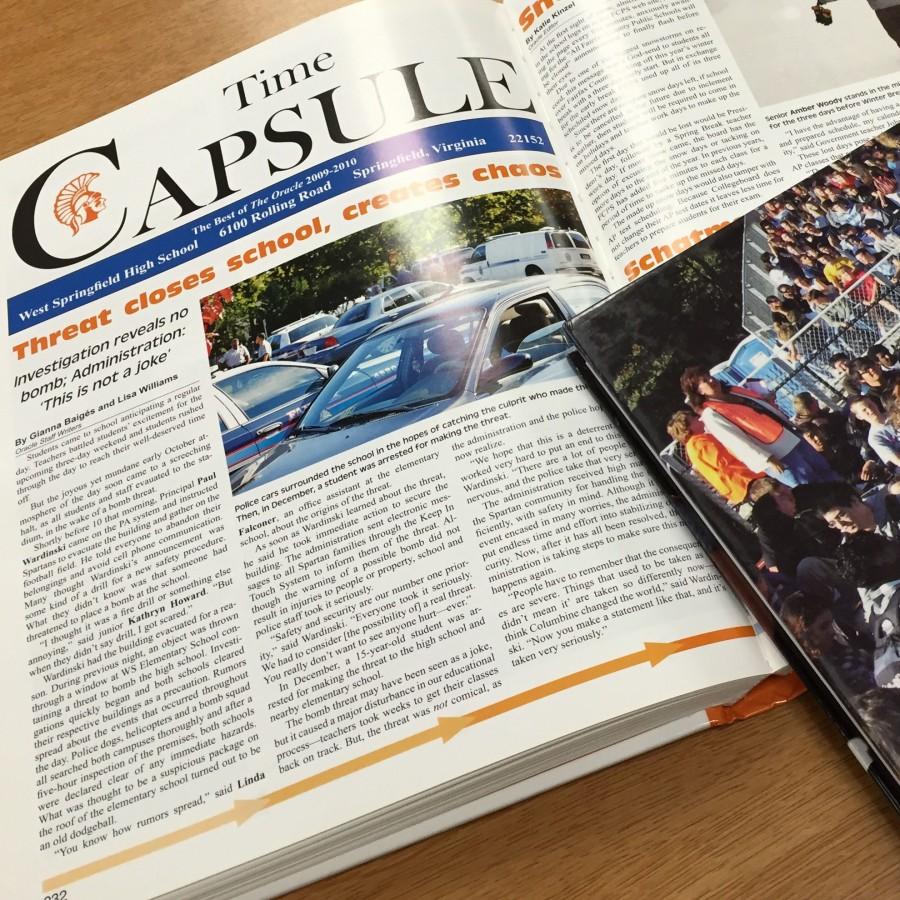Ripped from the headlines
October 7, 2015
The Spartans have been known for making news the last several years. These headlines aren’t always flattering and the administration wants to do something about our bad press.
The sports team members charged with grand larceny while on a Spring Break tournament trip to Florida (2009). A bomb threat that sent us to the stadium for hours and eventually closed school (2010).
The collossal food fight—and ensuing controversy over Prom—which made the front page of more than one national publication, including The Washington Post (2011). The sophomores charged with felony pornography (2013); the band director arrested at school (2014).
Even #closefcps could be seen as negative publicity for our campus. Last January’s Twitter phenomenon, which trended worldwide and was picked up by both traditional and online news outlets such as Buzzfeed and Gawkr, featured a photo of sad students peering out of one of our classroom windows at 6100 Rolling Road in the wake of a bad call on what should have been a snow day.
At class meetings a couple of weeks ago, administrators told students to “stay out of the paper” and “not have any more scandals” that could add to our publicity woes, which have plagued us the last seven years.
“Good news is ignored. We needed a humorous and lighthearted way to remind [students] to be careful,” Assistant Principal Becky Brandt said.
Even though some of these negative headlines (the mishandling of the food fight, when administrators threatened to cancel Prom, the arrest of the band director—who is now serving 12 years in prison—and last year’s #closefcps campaign come to mind) involved adults, our administration wants to make it known that students need to be careful about their actions and what they post on the Internet, text and talk about.
Anyone can be listening or watching at any time, which also sometimes works to the benefit of the school. The WS Dance Team’s meteoric rise to the top of the charts on “America’s Got Talent” during the 2011-2012 school year certainly generated good feelings toward the Spartan community.
The bad news, however, always seems to make national —and even international—news, putting the school in a bad light. “It makes me feel like our school is always a disappointment,” junior Blake Kirkman said.
It’s true that the recent scandals that made national headlines were not considered good news. Any event that involves jail time is bound to be noticed by the media, whether a student or an adult is involved. And most of the time, someone is punished for the actions that got them noticed.
The food fight of 2011—which errupted during “C” Lunch and left the cafeteria covered from ceiling to floor with rotten vegetables and eggs that instigators brought in several plastic garbage bags to school—was all over the TV news and in newspapers from coast-to-coast. In that case, the principal at the time made the situation worse, and arguably more news-worthy, by threatening to cancel Prom unless the perpetrators came forward.
Even though we seem to keep making mistakes that get us in the news, some students feel as though we don’t need to be told to avoid scandals this year. They believe we’re old enough to know the difference between right and wrong.
“[The administration] doesn’t have to say it; we already know it’s a bad thing,” Kirkman said.
Since we are teenagers, our teachers almost always remind us that we should already know to do the right thing. In reality, the administration believes it still has to remind Spartans about the difference between good and bad. In the junior and senior class meetings, to go over Student Rights & Responsibilities and other expectations, Brandt and Senior Class Administrator Shannon Matheny had to give specific examples of the difference between good and bad publicity for the school.
FCPS is one of the top school districts in the nation, but of course every place has its flaws. Even with the hope of becoming a better school overall, we can’t promise that this year will be free of newsworthy events.
“[Having something happen] is inevitable. People make bad choices all the time,” junior Katie Kachejian said.





